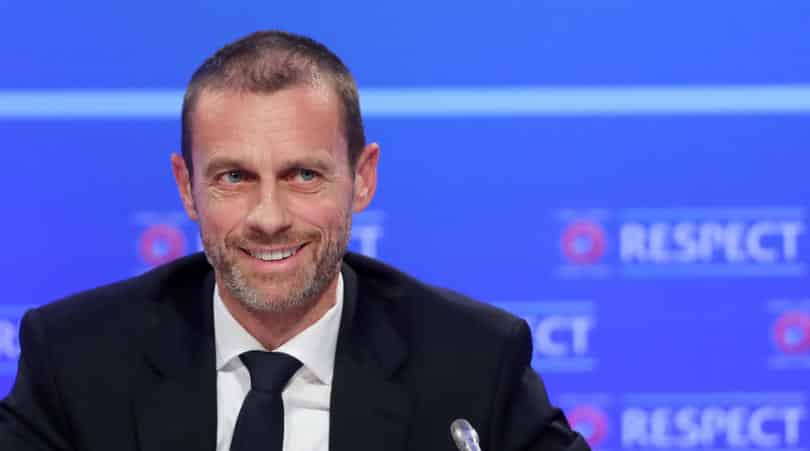Claims by the European Super League’s founder clubs that their competition would better protect the football pyramid have been ridiculed in a new Uefa report.
Twelve of Europe’s top clubs announced themselves as founder members of the new league on April 18, promising more than 10 billion US dollars (just over £7billion) in solidarity payments to clubs outside the competition over the initial commitment period, which was reported to be 23 years.
The league collapsed within 72 hours amid fan protests and pressure from UEFA, FIFA, governments and national associations, and UEFA president Aleksander Ceferin said the league “gave with one hand and took with five”.

In a wide-ranging new benchmarking report called ‘The European Club Football Landscape’, UEFA points out that it gave 558 million euros (almost £482million) a year in solidarity payments from the Champions League in the 2018-21 cycle, a sum “set to increase significantly” between 2021-24.
“Reports of 10 billion dollars over 23 years and wildly misleading claims of tripling of solidarity need to be put into proper context, even if they never come to pass,” the report stated.
“Without going into detailed calculations, a modest growth rate of five per cent a year (well below historic and current rates) would be expected to generate more than 28 billion dollars in (UEFA) solidarity over 23 years. Needless to say, 10 billion dollars is not three times 28 billion dollars.”
The report said the 558 million euros in solidarity is divided into 108m for clubs who do not progress beyond the Champions League qualifying rounds, 32m for the clubs knocked out in the play-offs, 130m in youth development funding for clubs across Europe who have not qualified for any UEFA competition, 269m for assumed costs and subsidies for the Europa League and 21m for UEFA which is fed back to national associations.
The report forecast that Europe’s professional clubs would miss out on at least 8.7 billion euros (£7.5bn) in revenue over the 2019-20 and 2020-21 seasons due to the coronavirus pandemic.
That figure included an estimate of 7.2 billion euros lost to top-tier clubs, but the maximum damage that could be inflicted to those clubs was put much higher, at 8.1 billion euros.
That higher figure comprised four billion euros in lost gate receipts, 2.7 billion in lost sponsorship and 1.4 billion lost broadcast revenue, the report said. It found clubs were losing 85 million euros a week in matchday revenue.

In the foreword to the report, Ceferin wrote: “This report outlines how broadcast penalties, empty stadiums, reduced commercial revenues, and the collapse in transfer profits have led to a projected 8.7 billion-euro shortfall in professional club revenues, with pain shared equally among top and lower tier clubs, only partly compensated by cost savings.
“Competition structures that destroy value, offering to give with one hand while taking away with five hands, are certainly not the answer.
“The whole football ecosystem, at professional, amateur and youth levels, has been heavily disrupted by the pandemic. This requires concerted efforts and a co-ordinated response throughout the football pyramid. Solidarity, not self-interest, must prevail and will win the day.”
The report said the ESL would also have inflicted “severe commercial damage” on domestic leagues. It stated that the broadcast deals for the Premier League in England, Serie A in Italy and LaLiga in Spain are worth 8.5 billion dollars a year and that “the effects of cannibalising that commercial value for any length of time would quickly add up to the many tens of billions”.

The report found that UEFA’s decision to postpone Euro 2020 until this summer and to delay the final stages of the 2019-20 continental club competitions until August last year meant two billion euros of revenue was saved by domestic leagues which would otherwise have been lost in broadcaster penalties and rebates.
From the start of 2020 to the report’s publication, 52 clubs from 24 different countries suffered a “serious financial event” – either withdrawal or exclusion from their league on financial grounds and/or some type of insolvency proceeding.
In the calendar year 2020 alone, 42 clubs experienced such an event, far exceeding the previous record of 34 from 2011 at the height of club overspending before the introduction of Financial Fair Play.
The report stated the importance of FFP and said it was “sobering” to think what would have happened if the Covid crisis had struck in the early part of the last decade.
It said future rules would “need a much stronger focus on the present and the future” rather than the past and that wages and transfer fees “must be reduced to acceptable levels”.
“It is time to act. Severe situations require strong and swift responses,” the report said.





